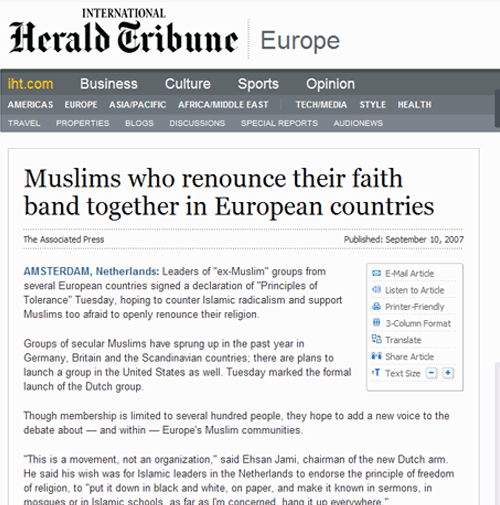Muslims who renounce their faith band together in European countries, International Herald Tribune
Muslims who renounce their faith band together in European countries
The Associated Press Monday, September 10, 2007
AMSTERDAM, Netherlands: Leaders of “ex-Muslim” groups from several European countries signed a declaration of “Principles of Tolerance” Tuesday, hoping to counter Islamic radicalism and support Muslims too afraid to openly renounce their religion.
Groups of secular Muslims have sprung up in the past year in Germany, Britain and the Scandinavian countries; there are plans to launch a group in the United States as well. Tuesday marked the formal launch of the Dutch group.
Though membership is limited to several hundred people, they hope to add a new voice to the debate about ? and within ? Europe’s Muslim communities.
“This is a movement, not an organization,” said Ehsan Jami, chairman of the new Dutch arm. He said his wish was for Islamic leaders in the Netherlands to endorse the principle of freedom of religion, to “put it down in black and white, on paper, and make it known in sermons, in mosques or in Islamic schools, as far as I’m concerned, hang it up everywhere.”
Under some interpretations of Islam, changing religion is forbidden, and apostasy is a heresy punishable by death.
Jami, 22, a councilman in the city of Voorburg, has been assaulted three times since announcing plans for a Dutch group in May, and now receives police protection.
Only a handful of people have formally joined the group so far, which Jami blamed on the intimidation, the beatings and threats he had undergone.
“Our intent is to break the taboo” within Islam against renouncing religion, said Maryam Namazie, who in June founded The British Council of Ex-Muslims. It now has around 70 members.
“The first step is making it easier to do that. You could compare it to when the first gays came out of the closet,” she said.
The German group, the first and largest of the European organizations, was founded in January and now has around 400 members, according Chairwoman Mina Ahadi, who has also received death threats.
Dozens of prominent Dutch intellectuals, including author Ayaan Hirsi Ali ? now living in the United States ? and politicians on the far right and left of the political spectrum signed a statement of support for the group.
But centrist politicians boycotted the event, as did some other secular Muslims, arguing that the timing of the group’s launch on Sept. 11 was provocative and Jami’s tone is anti-Muslim, rather than anti-religion.
In an interview Monday with the Associated Press, Jami likened fundamentalist Islam with a “cancer” and with Nazi fascism because of its determination to “overrule the world.”
“The primary meaning of Islam in Arabic is not ‘peace,’ but ‘submission,’ submission to the ideas and the values of Arab tribes living in the 7th century,” he said Tuesday.
Akbar Ahmed, who chairs the Islamic Studies department at American University in Washington, said the advent of such groups is not surprising.
“Expatriates may be intellectually questioning, given the freedom they have from being abroad,” he said. “A few may decide they are fed up with Islam ? others become much more vigorously Islamic.”
He said it is wrong to say Islam endorses killing apostates, though some of the Hadith, or sayings attributed to Mohammed, endorse it ? when taken out of context, he said. However, he said a cultural revulsion at the idea of apostasy is common in Islamic communities.
Hirsi Ali, the Somali-born Dutch lawmaker who abandoned Islam and lived under threat for years for her provocative criticism of fundamentalism, said she was “shocked” by the attacks on Jami.
“The rule of law, the basis of a state with civil liberties, is hollow if it becomes dangerous to do your shopping,” Hirsi Ali said in a statement from the United States, where she took up residence last year after quitting the parliament.

